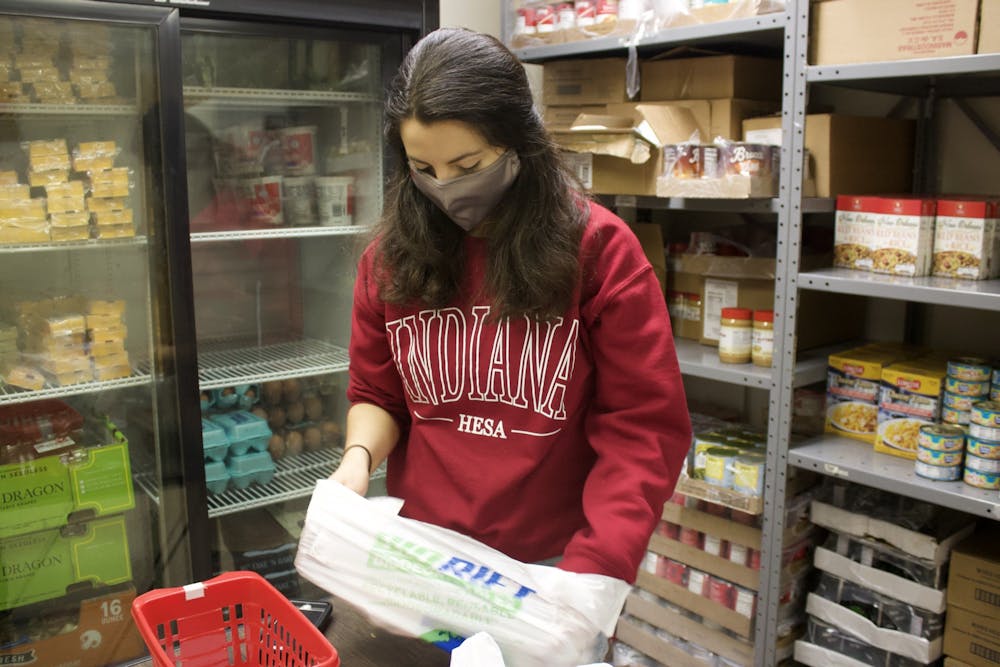Not many people think about or pay attention to food insecurity until they are put in a position where they no longer have food on their plate. With the COVID-19 pandemic ongoing, it's no surprise many families struggle to pay for everything they need.
Food insecurity has drastically increased as a result, including in Bloomington. Community support — through donations or volunteering — for the organizations working to alleviate food insecurity continues to be necessary.
[Related: OPINION: Blame weak leadership, not food shortages, for global hunger]
Monroe County United Ministries, which operates a Bloomington food pantry, serviced almost 800 new households in 2020. The organization’s executive director, Katie Broadfoot, said 92% of those families sought help after the pandemic started.
“We have seen so many people who have never had to ask for assistance before when it comes to needing help being able to afford food, more than we have ever seen before,” Broadfoot said.
It's clear many families all over the country are struggling to provide meals for themselves. Because of the economic crisis caused by the COVID-19 pandemic in the United States, according to NPR, nearly one in four households experienced food insecurity in 2020 — more than doubling from 2019.
Even with new hope of vaccines being administered to the general public, the effects of the pandemic continue to economically affect people. Without the work pantries such as Monroe County United Ministries are doing for the community, many families would have no one to turn to.
“People are in general, especially with the new people that come to our pantry, they are pretty stressed out,'' Broadfoot said. “They haven’t had to navigate the social services network before, and it’s really a lot to take in.”
Food insecurity harms a person’s health in more ways than the physical. According to Forbes, the outcomes of food insecurity in adults include poor diet quality, but it can also include less physical activity, worse sleep, obesity, diabetes, lower cognitive function and depression.
“One thing that we are really paying attention for is the physical and mental health outcomes, especially in terms of households with children,” Broadfoot said.
In children, these possible health outcomes can be increased developmental risk, school absence, aggression, anxiety, behavioral disorders, depression and other mental health issues.
Many of those outcomes are not due to the lack of food alone. The chronic stress food insecure people face every day by not knowing when or where their next meal will come from harms mental health.
In addition, many can experience other forms of psychological distress such as isolation from the rest of the community, shame and embarrassment using federal programs or other methods of acquiring food, as well as frustration and anger about the situation.
All of these feelings are completely valid, and they demonstrate food insecurity is about much more than just being hungry.
Food insecurity has long-term effects on people’s mental and physical well-being. The pandemic has forced many people into this situation, and although some will come out on the other end strong, there are people who will still feel the effects of the situation for years to come.
People should never have to worry about when they will get their next meal. Local pantries in the Bloomington area are doing so much to combat the issue of food insecurity, but we need to be doing more to prevent people from becoming food insecure in the first place.
Food insecurity will most likely always be a problem communities face. Doing our best to minimize its occurrence and provide help to those who need additional assistance needs to be on the forefront of our minds as we continue to navigate this pandemic.
If you can, you should donate your time, money or resources to help the food pantries in the Bloomington area.
Most importantly though, we need to push for structural change to diminish the prevalence and effects of food insecurity in our community.
Find ways to help at Monroe County United Ministries’ website.
Aidan Kramer (she/her) is a freshman studying microbiology. She hopes to pursue a career in medicine after she graduates.






